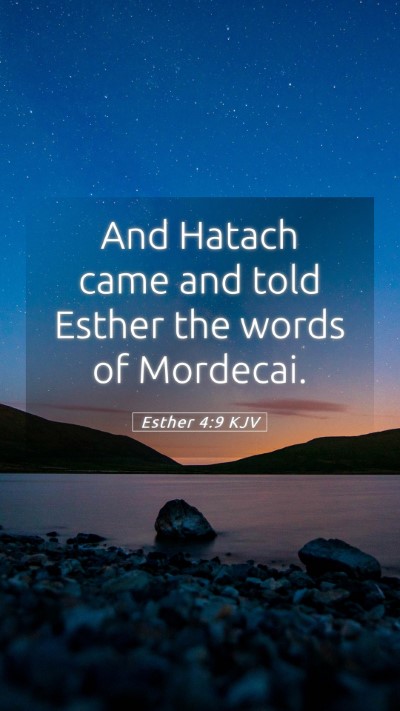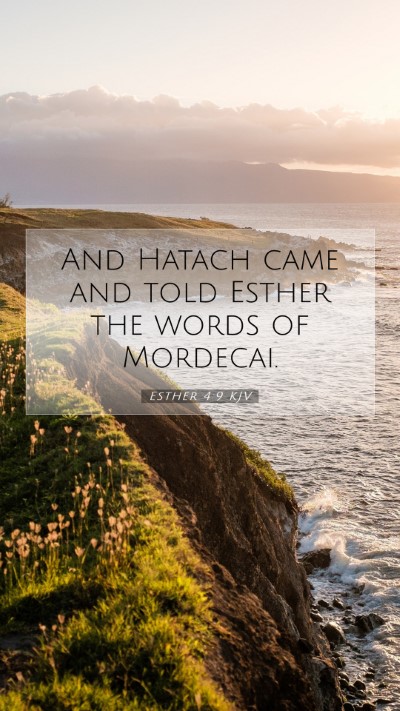Old Testament
Genesis Exodus Leviticus Numbers Deuteronomy Joshua Judges Ruth 1 Samuel 2 Samuel 1 Kings 2 Kings 1 Chronicles 2 Chronicles Ezra Nehemiah Esther Job Psalms Proverbs Ecclesiastes Song of Solomon Isaiah Jeremiah Lamentations Ezekiel Daniel Hosea Joel Amos Obadiah Jonah Micah Nahum Habakkuk Zephaniah Haggai Zechariah MalachiEsther 4:9 Meaning
What is the meaning of Esther 4:9?
And Hatach came and told Esther the words of Mordecai.
Esther 4:9 Bible Verse Meaning
Bible Verse Meaning and Commentary on Esther 4:9
The verse Esther 4:9 is a crucial moment in the Book of Esther, where a message is sent to Queen Esther concerning the plight of the Jewish people. This verse plays a significant role in understanding the faith and courage of Esther as she faces a dire situation.
Verse Analysis
In Esther 4:9, the text reads:
"And Hatach went and told Esther the words of Mordecai."
This brief yet impactful statement opens the window to a dramatic narrative that showcases themes of courage, identity, and divine providence.
Commentary Insights
- Matthew Henry: Henry emphasizes the significance of Mordecai’s message to Esther. He notes that Hatach's role as a messenger is essential; it illustrates the divine orchestration where God uses individuals to relay crucial information. The courage displayed by both Mordecai and Esther is a testament to their faithfulness.
- Albert Barnes: Barnes reflects on the anonymity of Esther's Jewish identity during this time. He also highlights the urgency of Mordecai's message, suggesting that Esther must act decisively. He points out that the royal position does not exempt her from the responsibilities towards her people.
- Adam Clarke: Clarke provides an in-depth look at the cultural context of Esther's situation. He interprets Hatach’s delivery of Mordecai’s words as a pivotal moment that sets the stage for Esther’s eventual actions in advocating for her people. Clarke emphasizes the moral and ethical implications of Esther’s decisions.
Spiritual Significance
The verse serves as a call to action. Esther, who was hesitant at first, is reminded of her duty to her people. Their plight becomes her own. This is resonant in the greater biblical theme that God's people are often called to step into difficult situations for the sake of justice and righteousness.
Related Themes
- Courage in the Face of Adversity: Esther's journey reflects the courage required to take risks for others, a significant theme in many biblical narratives.
- Divine Providence: The events surrounding Mordecai and Esther highlight how God orchestrates events for the ultimate good of His people.
- Identity and Heritage: Esther’s hidden Jewish identity becomes a pivotal element in understanding her role in salvation history.
Cross References
- Genesis 50:20: Joseph's acknowledgment that God has used his suffering for a greater purpose.
- Jeremiah 29:11: God's promise for a hopeful future, reflecting His plans for His people.
- Romans 8:28: The assurance that all things work together for good for those who love God.
Conclusion
Esther 4:9 encapsulates the essence of standing up for one’s faith and people, making it a rich subject for Bible verse meanings and interpretations. As believers engage with this text through Bible study insights and commentary, they find not only historical context but also personal application that encourages both courage and faithfulness in their own lives.
Further Study
For those interested in an in-depth Bible verse analysis of Esther 4:9, consider forming Bible study groups or utilizing online Bible study resources to foster discussions on this theme of courage and divine purpose.


